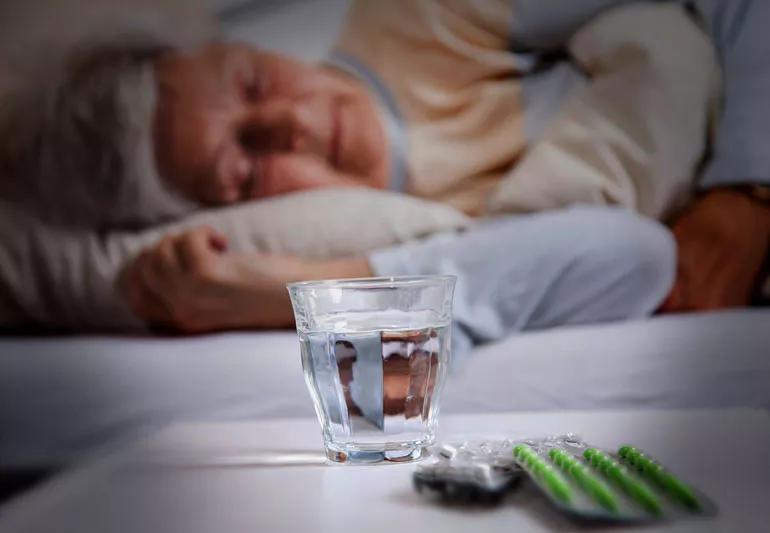Here’s what you need to know about these medications

Image content: This image is available to view online.
View image online (https://assets.clevelandclinic.org/transform/49a4ae57-7ca1-43a2-9125-f295f7355f84/sleepAidMedications-524908690-770x553-1_jpg)
sleeping medication
About 30% of adults have symptoms of insomnia, a condition where you have difficulty falling and staying asleep. Out of that group, about 10% of people have severe symptoms that affect their day-to-day lives. When that’s the case, a diagnosis of the sleep disorder known as insomnia might be appropriate.
Advertisement
Cleveland Clinic is a non-profit academic medical center. Advertising on our site helps support our mission. We do not endorse non-Cleveland Clinic products or services. Policy
In the short term, insomnia can cause excessive daytime sleepiness, trouble with attention and concentration, and drowsy driving. Over time, it can cause health problems, such as an increased risk of high blood pressure and diabetes.
“Insomnia has many consequences,” says sleep medicine expert Michelle Drerup, PsyD, DBSM. “Sleep is crucial for well-being.”
For people who have a hard time snoozing, medications for insomnia — aka, sleeping pills — might seem like a dream come true. But anyone taking sleeping pills needs to be aware of some potentially serious risks.
Sleeping pills are prescription medicines you can take to help you fall asleep — and then stay asleep — and wake up at your chosen time. Ideally, you would take these pills only temporarily, since you can become dependent on them.
Common prescription sleeping pills include:
Sleeping pills have a sedative effect. “It’s not like these pills work only when you’re sleeping,” notes Dr. Drerup. “You may feel drowsy and groggy, or have slowed thinking, after you wake up. This is when you want to be alert, obviously.”
Advertisement
For people who need to drive a car in the morning, being drowsy while behind the wheel can be dangerous. But feeling groggy isn’t the only potentially serious side effect.
“People have also reported abnormal behaviors after taking sleep aids,” Dr. Drerup says. “They’ve done things without awareness, like sleep-eating. There have even been incidents of sleep-driving.”
In recent years, the U.S. Food and Drug Administration (FDA) announced new warnings about certain prescription medications for insomnia. In fact, the FDA now requires certain prescription sleep aids to include a black box warning on their labels. It calls attention to serious — even life-threatening — risks.
These FDA warnings apply to the non-benzodiazepine receptor agonists class of prescription drugs mentioned above. These medications can cause rare but serious incidents the FDA calls “complex sleep behaviors.”
Those include sleepwalking, as well as engaging in other activities while not completely awake, including potentially dangerous ones like using the stove or driving a car.
The FDA required the new warning labels after it reviewed reports of serious events that happened when people used the medications, including deaths due to car crashes and drowning.
While these incidents are rare, they could happen whether you’re taking a medication for the first time or have been using it for months.
“Be aware of these warnings so you can watch for any side effects,” Dr. Drerup says.
Anyone who has experienced complex sleep behaviors — even once — should stop taking sleeping pills. In fact, the FDA also added a “contraindication” for these medications, a formal warning that you shouldn’t take a sleeping pill if you’ve had a reaction.
How will you know if you’re up and about while you’re asleep? If you have a bed partner, they’ll likely notice you getting up and moving around. You might also see evidence of nighttime activity, like dishes and utensils from a mysterious midnight snack left on the counter.
What happens if you want to stop taking sleeping pills? You don’t have to give up on the dream of a restful night.
In fact, guidelines from the American College of Family Physicians and The American Academy of Sleep Medicine recommend trying things besides sleeping pills first anyway.
“Behavioral strategies should be first-line treatment for insomnia versus medications,” advises Dr. Drerup. Cognitive behavioral therapy for insomnia (CBT-I), which she says focuses on the behaviors and thoughts that are “disruptive and perpetuating your insomnia,” is a great first alternative.
Advertisement
“Cognitive behavioral therapy for insomnia is our gold standard treatment,” explains Dr. Drerup. “This first-line treatment for insomnia tends to have much better outcomes in the long term when we compare it to using a sleep aid or a sleep medication. It’s safe, effective and has no side effects. Once you learn good sleep habits, the effects are long-lasting.”
However, Dr. Dreup says there’s not one best sleep aid that works for everyone. It’s important to talk to your doctor to understand the risks of sleeping pills, and discuss the pros and cons of any treatment options you decide to choose.
“When taken by healthy adults, sleep aids usually can be safe for short-term use as long as they’re used as prescribed or directed,” says Dr. Drerup. “However, there’s a potential for side effects, so obviously, it’s always safest to do this under the guidance of your doctor.”
Advertisement

Sign up for our Health Essentials emails for expert guidance on nutrition, fitness, sleep, skin care and more.
Learn more about our editorial process.
Advertisement
Excess alcohol and substance use can cause temporary and permanent memory loss
A Q&A to help you understand the research — and how to protect you and your loved ones
Bleeding is a risk and warrants taking care, but the reward of this lifesaving medication is great
Severe and debilitating headaches can affect the quality of your child’s life
With repeat injections over time, you may be able to slow the development of new wrinkles
Type 2 diabetes isn’t inevitable with these dietary changes
Applying a hot or cold compress can help with pain
Pump up your iron intake with foods like tuna, tofu and turkey